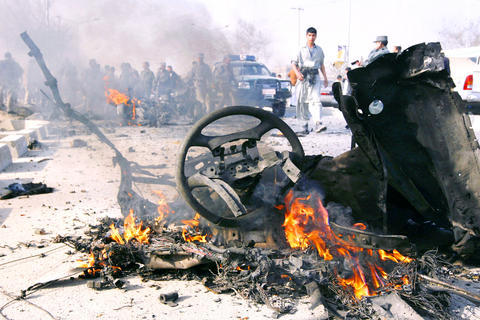A suicide car bomber rammed a convoy carrying foreign troops near the airport in Kabul yesterday, killing six civilians and wounding 18, police said.
The Taliban movement claimed responsibility for the blast, which happened during the morning rush-hour on one of the city's busiest roads and damaged around a dozen vehicles.
"Six civilians were martyred and 18 other civilians were wounded in the suicide car bomb attack against coalition forces," Kabul police chief General Salim Ahsas said.

PHOTO: AP
Ahsas said the blast did not harm foreign troops who were travelling on the road to Kabul's international airport when the bomb exploded.
A spokesman for the coalition could not immediately comment on the incident.
Two armored vehicles, apparently the target of the attack, were damaged, a reporter at the scene said. Blood and scraps of human flesh littered the road along with the wreckage of cars, some of which were on fire.
The force of the blast damaged about 10 cars, said General Ali Shah Paktiawal, head of the police criminal investigation branch.
The wounded were rushed to different hospitals in the city, he said.
The Taliban said it was behind the blast -- similar to scores of others carried out by the insurgents.
"We claim responsibility for the suicide attack in Kabul today," Taliban spokesman Zabihullah Mujahid said in a telephone call from an unknown location.
"The attack was against two foreign military vehicles which killed all the soldiers in the two vehicles," he said.
The Taliban have often made claims about casualties from attacks which subsequently prove exaggerated.
Heavily guarded Kabul has suffered a rash of recent suicide bombings.
The last attack in Kabul was on Jan. 31 when a suicide attacker detonated his explosives-laden vehicle near an army bus, killing a civilian and wounding a handful of people, including an army officer.
On Jan. 14 Taliban militants staged a multiple suicide attack on the five-star Kabul Serena hotel that killed at least eight people, three of them foreign nationals.
That attack -- which involved suicide blasts, gunfire and grenade explosions -- was the first of its kind in the city and different in style to the Taliban's regular fare of suicide and roadside bombings.
Last year was the deadliest of an insurgency launched soon after the Taliban's five-year government was ended in an invasion led by the US with the backing of anti-Taliban Afghan movements.
About 6,000 people were killed, most of them insurgents but also about 1,500 civilians.
In other violence yesterday, a roadside bomb killed three policemen and wounded four in the southern province of Ghazni.

THE ‘MONSTER’: The Philippines on Saturday sent a vessel to confront a 12,000-tonne Chinese ship that had entered its exclusive economic zone The Philippines yesterday said it deployed a coast guard ship to challenge Chinese patrol boats attempting to “alter the existing status quo” of the disputed South China Sea. Philippine Coast Guard spokesman Commodore Jay Tarriela said Chinese patrol ships had this year come as close as 60 nautical miles (111km) west of the main Philippine island of Luzon. “Their goal is to normalize such deployments, and if these actions go unnoticed and unchallenged, it will enable them to alter the existing status quo,” he said in a statement. He later told reporters that Manila had deployed a coast guard ship to the area

HOLLYWOOD IN TURMOIL: Mandy Moore, Paris Hilton and Cary Elwes lost properties to the flames, while awards events planned for this week have been delayed Fires burning in and around Los Angeles have claimed the homes of numerous celebrities, including Billy Crystal, Mandy Moore and Paris Hilton, and led to sweeping disruptions of entertainment events, while at least five people have died. Three awards ceremonies planned for this weekend have been postponed. Next week’s Oscar nominations have been delayed, while tens of thousands of city residents had been displaced and were awaiting word on whether their homes survived the flames — some of them the city’s most famous denizens. More than 1,900 structures had been destroyed and the number was expected to increase. More than 130,000 people

A group of Uyghur men who were detained in Thailand more than one decade ago said that the Thai government is preparing to deport them to China, alarming activists and family members who say the men are at risk of abuse and torture if they are sent back. Forty-three Uyghur men held in Bangkok made a public appeal to halt what they called an imminent threat of deportation. “We could be imprisoned and we might even lose our lives,” the letter said. “We urgently appeal to all international organizations and countries concerned with human rights to intervene immediately to save us from

RISING TENSIONS: The nations’ three leaders discussed China’s ‘dangerous and unlawful behavior in the South China Sea,’ and agreed on the importance of continued coordination Japan, the Philippines and the US vowed to further deepen cooperation under a trilateral arrangement in the face of rising tensions in Asia’s waters, the three nations said following a call among their leaders. Japanese Prime Minister Shigeru Ishiba, Philippine President Ferdinand Marcos Jr and outgoing US President Joe Biden met via videoconference on Monday morning. Marcos’ communications office said the leaders “agreed to enhance and deepen economic, maritime and technology cooperation.” The call followed a first-of-its-kind summit meeting of Marcos, Biden and then-Japanese prime minister Fumio Kishida in Washington in April last year that led to a vow to uphold international